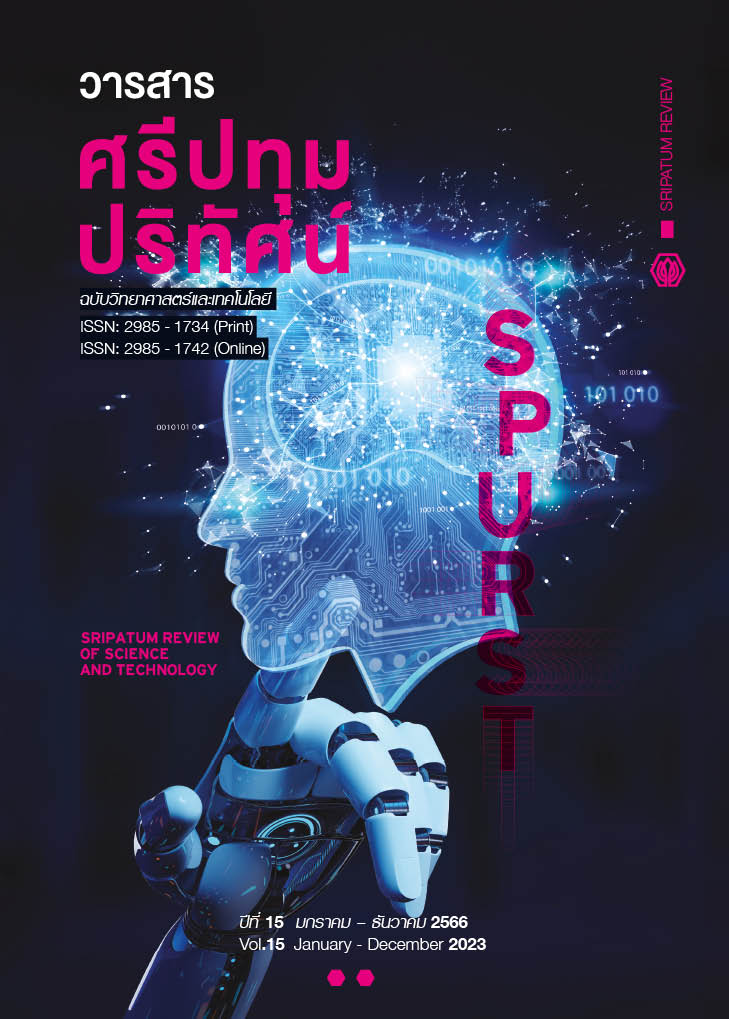Modeling Carbon Footprint Measurement Performance in Warehouse Activities
Main Article Content
Abstract
The objectives of this research were (1) to study activities that affect on carbon footprint emissions in warehouse, (2) to create a model for measuring the efficiency of carbon footprint emissions in warehouse activities, and (3) to develop guidelines for reduce carbon footprint in warehouse activities. This study was research and development by using qualitative research. In-depth Interview was used to collect data with 17 samples that obtained by purposive sampling, according to the criteria for determining and selecting experts. Descriptive data analysis and triangulation methods were used to analyze data. The results found that (1) warehouse activities include receiving, storing, picking, shipping, and delivering goods affects on carbon footprint emissions. However, effective management of these activities could reduce environmental impacts (2) a warehouse carbon footprint efficiency measurement model was created based on data from a study of warehouse activities and the measurement program of the Thailand Greenhouse Gas Management Organization, the model could assess the carbon footprint of each activity in warehouse by evaluating the total energy use (3) the guidelines for reducing carbon footprints in warehouse activities consist of using determine the source of carbon footprint emissions in warehouse processes and energy using that emits the highest to the lowest, direct and indirect of greenhouse gas emissions, as well as improving and developing transportation methods, using environmentally friendly materials and increasing efficiency in saving energy.
Article Details
References
Cagliano, R., Perugini, M., & De Caroli, B. (2020). The effect of social media use on well-being: A meta-analysis. European Psychologist, 25(3), 235-246.
Cronbach, L. J. (1984). Essentials of psychological testing. New York: Harper & Row.
Greenhouse Gas Management Organization (Public Organization). (2022). Guidelines for calculating and reporting organizational carbon footprint (8th ed). Bangkok: Greenhouse Gas Management Organization (Public Organization). (in Thai)
Intergovernmental Panel on Climate Change. (2022). Guidelines for National Greenhouse Gas Inventorie. V.4(Agriculture, Forestry and Other Land Use), Bangkok: IPCC Secretariat. (in Thai)
Johnson, C. D., & Davis, E. F. (2021). Standardized frameworks for measuring warehouse carbon footprint. International Journal of Sustainable Logistics, 14(2), 78-92.
McNeish, D. (2018). The impact of social media on the sleep habits of adolescents. Journal of Adolescent Health, 63(4), 450-456.
Moser, A., & Korstjens, I. (2018). Understanding criterion sampling in qualitative research. Journal of Qualitative Research, 10(2), 123-135.
Nauda, P., & Biljon, J. A. (2019). The impact of social media on the self-esteem of adolescents. Journal of Child and Adolescent Mental Health, 31(2), 129-137.
Ries, J., Grosse, R., & Fichtinger, J. (2017). Environmental impacts of logistics: A literature review. Journal of Green Logistics, 5(4), 200-215.
Sikhiwat, W., Thonghom, W., Khwangsopha, S., Niamhom, T., & Pattanisranukul, V. (2021). Carbon Footprint of the Faculty of Public Health, Mahidol University, Phayathai Campus. Thai Science and Technology Journal, 29(4), 604-617. (in Thai)
Silcharu, P. (2017). The impact of social media on the mental health of adolescents. Journal of Mental Health, 26(2), 95-96.
Smith, J. D., Johnson, A. B., & Anderson, C. E. (2022). Warehouse Carbon Footprint Efficiency Measurement Model. Journal of Environmental Management, 45(3), 123-136.
Smith, J. T., Thompson, K. L., & Davis, A. B. (2022). Warehouse carbon footprint measurement: Addressing gaps in the literature. International Journal of Logistics and Supply Chain Management, 25(2), 123-136.
Srirod, P. (2019). Carbon Footprint for Organization and Sustainability Reduction of Gas Emissions for Regional Environmental Office. Thesis of Master of Science. Faculty of Environmental Development. Bangkok: Administration National Institute of Development Administration. (in Thai)
Staudt, F. H., Alpan, G., Di Mascolo, M., & Taboada Rodriguez, C. M. (2015). Warehouse performance measurement: a literature review. International Journal of Production Research, 53(18), 5524–5544.
Thompson, R. M., Smith, A. B., & Anderson, C. E. (2022). Gaps in research on warehouse carbon footprint measurement: A systematic review. Journal of Sustainable Logistics, 15(2), 78-92.
Thompson, K. L., & Smith, A. B. (2022). Key variables in warehouse carbon footprint measurement: An exploratory study. Journal of Sustainable Logistics, 15(1), 45-60.


